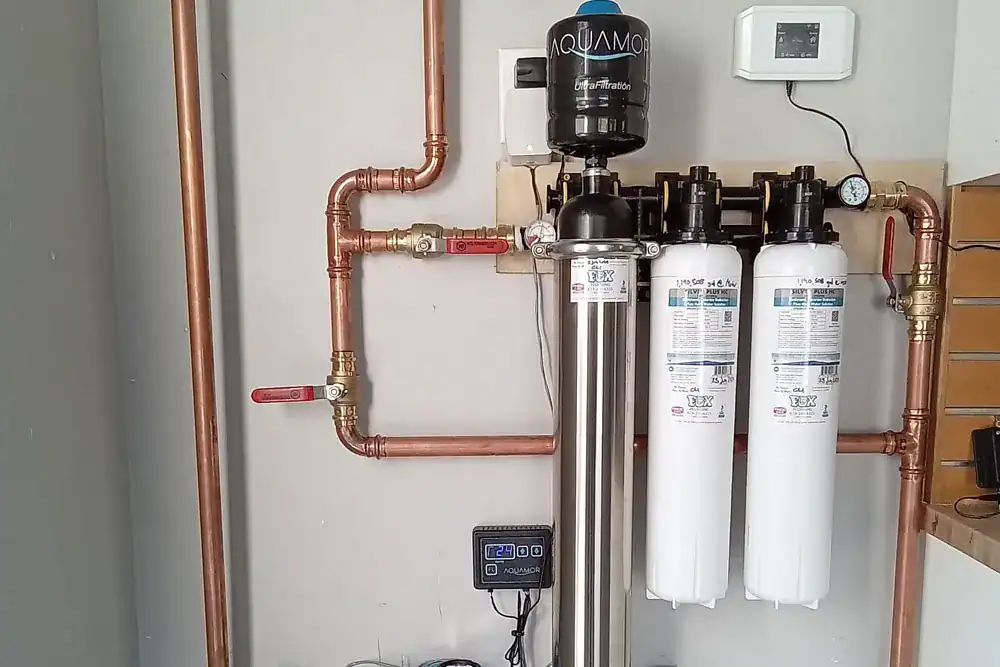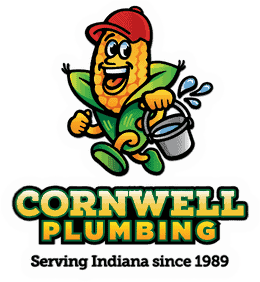
If you rely on well water, chances are you have noticed some issues with taste, staining, or even the way your water feels. Maybe your sinks and tubs keep getting stained, no matter how often you clean them. Maybe your laundry comes out looking dull, or your skin feels dry after every shower. Even the taste of the water itself can sometimes seem a little off.
The tricky part is figuring out what is behind it all. Is iron sneaking into your water? Is hard water leaving its mark? Or is it a mix of both? Most homeowners end up guessing, buying the wrong equipment, and then wondering why the problems never go away.
That is why it pays to sort it out before you spend a dime. Iron filters and water softeners both improve water quality, but they are built to solve different problems. Pick the wrong one, and you are back where you started – only now with less money in your pocket.
So how do you know which system is the right fit for your home? Let’s look closely at how each system works, what problems they solve, and how to know which is right for your home.
What an Iron Filter Does
If your bathroom sink looks like it is rusting from the inside out or your water smells like a carton of eggs left in the sun, you are probably dealing with minerals in your well water. The usual suspects are:
- Iron, which leaves behind those orange or brown stains that laugh at your cleaning products.
- Manganese, which creates black streaks that make shiny fixtures look permanently dirty.
- Sulfur, the culprit behind that unmistakable rotten egg smell that makes you think twice before taking a sip.
On their own, these minerals are annoying. Together, they can make your water taste metallic, ruin your laundry, and slowly wear out your appliances.
The way an iron filter works is fairly straightforward. Think of it as a bouncer for your water. It forces iron, manganese, and sulfur to show themselves by oxidizing them into tiny solid particles. Then it traps those particles in the filter media so they never make it to your faucet. Every so often, the system gives itself a rinse – a backwash cycle that flushes the junk out and resets for the next round.
The difference once it is installed is hard to miss. Water looks clear, smells normal, and actually tastes good. Fixtures stay clean, laundry comes out looking like laundry, and you can finally stop attacking your tub with harsh cleaners.
If rusty stains, smelly water, or streaky clothes have become part of your routine, an iron filter may be exactly what you need to break the cycle.
What a Water Softener Does
A water softener is designed to handle hardness, which comes from calcium and magnesium in your water. Hard water may not taste bad, but it has a big impact on your plumbing system and your day-to-day life. Over time, hardness minerals leave behind scale that coats pipes, water heaters, and appliances. That buildup reduces efficiency, increases energy costs, and shortens the lifespan of water-using equipment in your home.
The effects of hard water are easy to spot:
- Soap and shampoo do not lather well, making showers feel less refreshing.
- Dishes and glassware come out of the dishwasher with cloudy spots or streaks.
- Laundry feels stiff and rough instead of soft.
- Faucets and showerheads collect a white, chalky residue.
- Skin and hair feel dry because soap does not rinse away completely.
A water softener fixes these problems by removing calcium and magnesium through a process called ion exchange. The system replaces the hardness minerals with sodium or potassium, leaving the water soft.
With professional water softener installation, the benefits are noticeable almost immediately:
- Brighter and softer laundry.
- Cleaner dishes and glassware.
- Appliances and water heaters that last longer and run more efficiently.
- Water that feels smoother on skin and hair.
If you have spotted signs of hard water in your home, a properly sized and maintained water softener is one of the best investments you can make.
When You Might Need Both
In many homes, especially those using well water, the problem is not limited to iron or hardness alone. It is common to have both. In those cases, the most effective solution is to use an iron filter along with a water softener, or a combined system that handles both. The iron filter removes iron before it reaches the softener, which prevents clogging and extends the life of the softener.
You might need both if you notice:
- Orange or rust-colored stains in sinks, tubs, and toilets.
- Laundry coming out with yellow or brown streaks.
- Rotten egg odors in your water, often caused by sulfur.
- White, chalky buildup on faucets and showerheads.
- Spotty dishes and glassware from the dishwasher.
- Dry skin and hair, even after bathing.
Because no two wells are the same, professional water testing is the only way to know for sure. A reliable technician can measure iron, hardness, and other minerals in your water, then recommend the system that fits your home’s needs.
Why Professional Installation and Maintenance Matter
An iron filter or water softener is not like a coffee maker you can just plug in and forget about. It is a long-term investment in your water, and it only does its job if it is set up the right way and cared for over time. Put in the wrong size, and the system will run itself into the ground. Skip maintenance, and one day it just quits, leaving you back where you started – with stains, buildup, and water you don’t want to drink.
That is where professional installation makes all the difference. A good water company doesn’t just drop a box in your basement and call it a day. They take the time to:
- Test your water so you actually know what’s in it.
- Match the system size to your household instead of guessing.
- Hook everything up properly, plumbing and all.
- Make sure iron filters and softeners are set to work together if you need both.
- Keep the system tuned up with routine service.
- Handle repairs or even well work if something goes wrong later.
At Cornwell Well Pump and Water Solutions, we understand how important reliable water is for everyday life. That is why we handle every step, from testing and installation to ongoing care, so you can stop worrying about stains, smells, or buildup and simply enjoy clean, dependable water year after year.
Choosing the Right Solution for Your Water
When your sink has rust stains, your dishes keep spotting, or your water smells off, it’s easy to think you just need something to fix it. The hard part is figuring out what that something is. For some homes, it’s an iron filter. For others, it’s a softener. And in plenty of cases, you need both working together to really clean things up.
That’s why guessing never works. You end up spending money on equipment that doesn’t solve the problem, and the frustration is still there. The smarter way is to test the water first. At Cornwell Well Pump and Water Solutions, that’s where we start. We run the tests, show you what’s really in your water, and explain what that means in plain language. Then we put in the system that actually fixes it. And if down the road something needs attention, whether it’s service, water softener repair, or even a water well repair, we’re the ones who come back to take care of it.
With the right setup in place, your water looks clear, tastes fresh, and does its job without leaving stains or buildup behind. That is what every homeowner deserves, and that is what we deliver.
Got a Question About Your Well Pump or Water Softener? We're Here to Help!
Whether you're dealing with a tricky well pump issue, or your water softener isn't working as it should, we're just a call away. Reach out to Cornwell Well Pump and Water Solutions, and let our experts provide the answers and solutions you need to keep your water system running smoothly.










